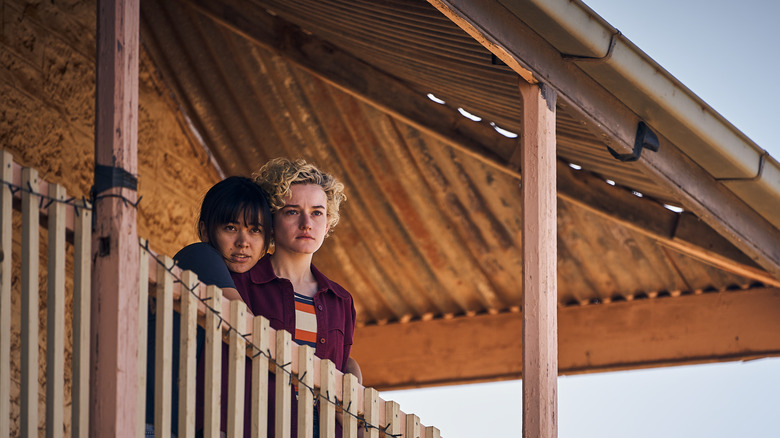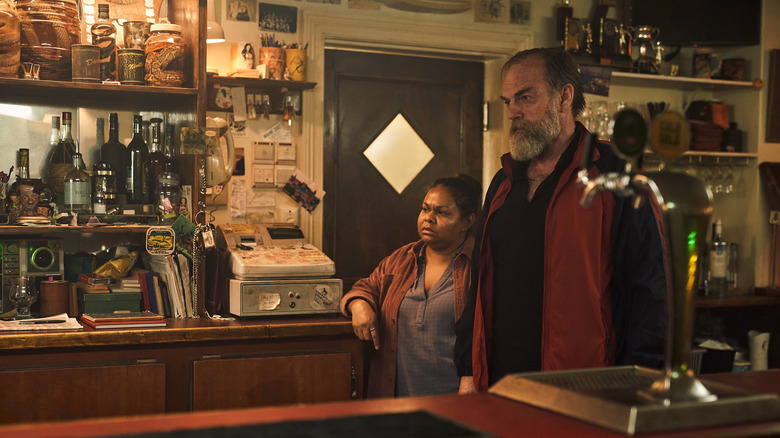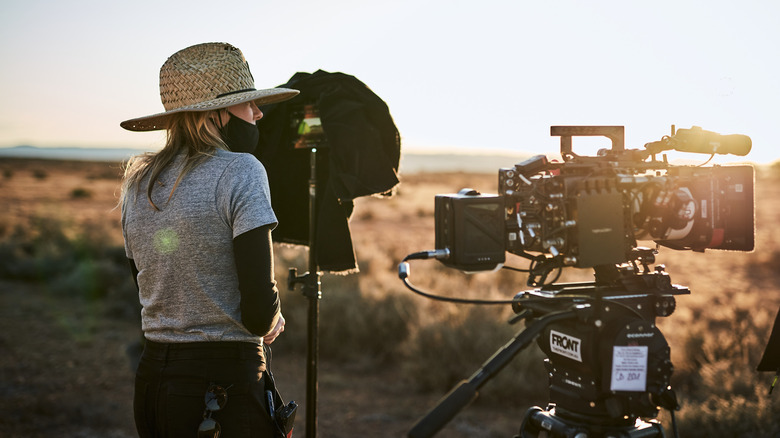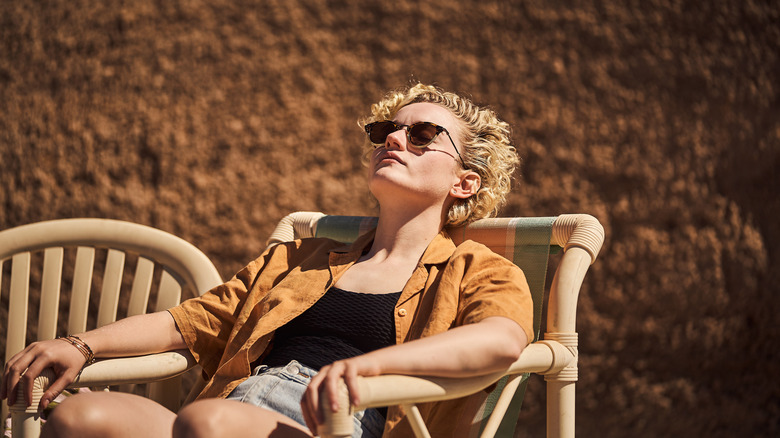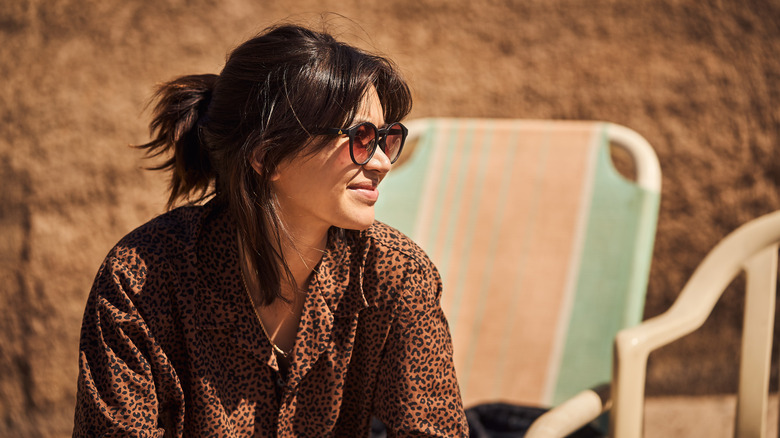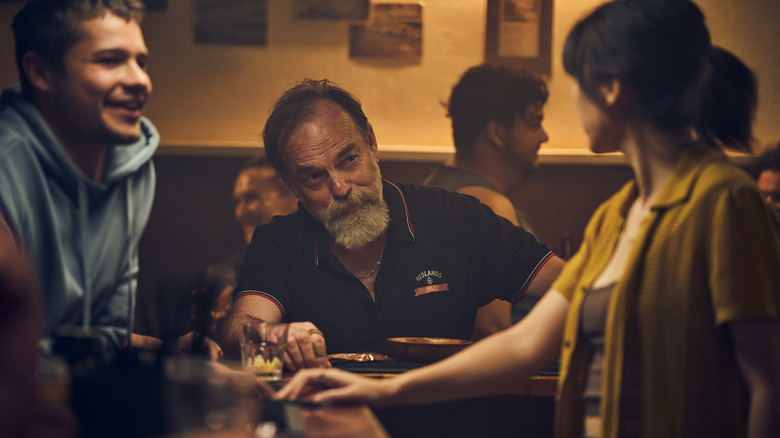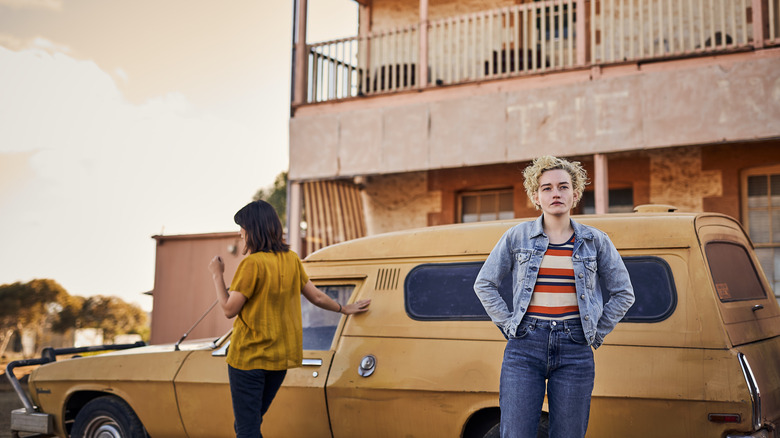The Royal Hotel Director Kitty Green On Crafting Her Tension-Filled Aussie Thriller [Exclusive Interview]
This post contains spoilers for "The Royal Hotel."
In early 2019, writer/director Kitty Green made "The Assistant," a small movie starring "Ozark" breakout Julia Garner as a junior assistant who works at the office of a Harvey Weinstein-like figure who has cultivated a culture of abuse. Now she's back with "The Royal Hotel," a very different, more ambitious film that nonetheless feels like she's exploring somewhat similar thematic territory. In a recent interview with /Film, Green described both films as "sort of like the gateway or entry point to sexual misconduct. What kind of behavior should we put up with? When should we say no? When should we put a stop to things? When should we speak up for ourselves?"
"The Royal Hotel" reunites Green with Julia Garner, who stars alongside Jessica Henwick ("Game of Thrones," "Iron Fist") as a pair of American women who run out of money while on vacation and take a job at an isolated hotel bar in the Australian Outback as a way to make some quick cash. "You're gonna have to be comfortable with a little male attention," a job placement official tells them, and since the bar is frequented by roughneck mining workers who tend to leer and drink too much, that declaration hangs like a specter over the whole film as that "male attention" takes various, increasingly nasty forms.
I spoke with Green over Zoom about how she translated such a palpable sense of menace from the script to the screen, working with a larger ensemble (including "The Matrix" and "The Lord of the Rings" veteran Hugo Weaving in a key supporting role), and what she learned from working with M. Night Shyamalan on "Servant." She also told me about the film's ending, but I saved that part for last and highly recommend seeing the film before reading the final chunk of our conversation.
Note: This interview has been lightly edited for clarity and brevity.
'There's so much going on'
This movie does such an amazing job of creating a sense of menace and tension. It's one thing to write that on the page, but it's an entirely different thing to translate or physicalize that in such an effective way. So I'm wondering if you can tell me about the actual filmmaking techniques that you use to achieve that feeling for an audience.
I mean, I think we had this problem getting the movie financed because I think people would read the script and be like, "Nothing happens. There's not much — nothing happens." And I was like, "Oh no, there's so much going on." But people can't, from a script necessarily, be able to tell that the guy saying that line is creepy. You know what I mean? Or the guy looking at them from the corner is creepy. So it's hard to really convey that, I think, in a text document.
And then it becomes about building the world and kind of layering it in. And that means lighting, and casting, and everything. It's sort of frame size and really honing in. I think the key to it, really, is a lot of it rests on Julia's expression and her acceptance of it, or understanding of it and fear of it, and being able to map that in her face and her expressions as we go is what it kind of hinges on. I think the fear is in her, in a lot of ways. So we're sort of presenting this world and then she's trying to make sense of it, and I think it's the combination of those things that give it what it needs. But there's also sound, music, all the things. There's a lot happening.
'Honestly, it's been the hardest job I've ever done'
I think you shot "The Assistant" in something like 19 days. Did you have more time for this one? What was the shoot like for you?
Yeah, we shot "The Assistant" in 18 days.
Wow.
And we shot this one in 25 days. And I tell you, 25 days is not enough for a [film like this], because those scenes are huge. There's not only 14 speaking roles in some of those scenes, but there's 30 or 60 extras, and it's just layers of people. It was so hard. Honestly, it's been the hardest job I've ever done. "The Assistant" was a breeze compared to this. It was really difficult. And we really had to be careful with coverage. We were really messed around by the weather. We shot the exteriors first and we lost a day or two to rain, and then we were just playing catch up.
So essentially, the whole thing was just cutting shots, and cutting things, and trying to figure out how to sew it together. "If we didn't have that shot, well, how do we show that, or convey that?" Or, "How do we get this scene down to six shots? She has to bring the cake out, and she ended up taking it around and showing it..." And it just became a really technical exercise, and a terrifying one, because it always felt like, "Oh Jesus, if only we had more time, we could do this." Sorry, I've forgotten the question, but I'm just going on to how difficult it was.
With the weather problems that happened early, and that sense of always being under the gun, did that force the story to change at all? How did the story evolve from the initial idea to what we saw in the final version?
No, I mean, we shot the script. It just means you just ... I'd love to get to the point in my career where they give me enough time where I get to play. I really don't get to play. I have to be very precise and I have to sort of almost figure it out in ... I pre-visualize it and then kind of know what I need, and get the most important things first. And there's kind of a layer missing. If I had it at the next budget level, I could have got this layer of detail that I just didn't have the time to get, which is just pieces of this bar and this place. It'd be lovely to feel that a little more and [for] it be a little more organic, but it ends up, because it's short shoot schedules, it ends up being very precise. And it seems to work. People seem to be — that's not what's rubbing people the wrong way or anything. So it was okay.
'I didn't want them to be coming from a history of some kind of sexual misconduct or something'
There's a moment in the movie where Jessica Henwick's character, Liv, nearly breaks down and says something along the lines of, "We were supposed to escape from everything and leave it all behind." The film never comes out and explicitly says what these main characters are running from, but did you have a definitive answer for that question?
I had an idea of what it was. I think Jess had a different idea of what it was. I kind of liked that, though. I kind of liked that she was coming from her space and I was coming from mine. It was important to me that it wasn't ... I didn't want them to be coming from a history of some kind of sexual misconduct or something, because I felt like, I mean, things like "Thelma and Louise" have done that, and there's other movies that have done that, and I didn't want this to be any kind of rape-revenge movie or anything in that space. I really just wanted it to be about bad behavior and what we tolerate as women, and we shouldn't have to tolerate X. And I didn't need them to have this history of whatever for that to be discussed. So yeah, I threw it in there and yeah, I don't know. It's also fun for people to figure it out themselves. And I don't want to give everyone all the answers all the time.
For sure. I was curious if you told the actors or if they, for their own processes, brought their own information to it. It sounds like it was maybe a little bit of both.
Definitely. Yeah, yeah.
'I needed us to be a trio'
So you've worked with Julia before, obviously, and I assume there's a shorthand between the two of you now. What was it like expanding the scope a little bit and working with more of an ensemble this time around?
Yeah, it was interesting, because "The Assistant" is basically just Julia and a copy machine. [laughs] There's a lot of scenes where it's just her and inanimate objects. And this one, it's her, plus 14 people, which was a huge thing to wrap my head around. But yeah, the first piece was Jess. The first piece was finding a best friend who not only is a great actor, but also just could naturally fit into Julia and my dynamic. We have a very specific friendship, partnership, and I knew I didn't want anyone to feel left out of that. I needed us to be a trio. So it was about going, "Well, how do we find that person?" And it became a casting thing where I was looking for something more just energetically, something that just — a chemistry thing that just fit. And Jess, it was pretty early on that I met Jess and I was just like, "Oh my God, this works. She's our friend." Immediately, I could tell. So that really helped.
And then beyond that, it was just finding the right guys. I mean, when you're casting people to play these dudes in this film, I mean, you need the right guys. You need people who understand the material firstly, who are sensitive to the subject matter, what we're saying, who are not going to crack bad jokes. So it really became about casting people and then figuring out, yeah, it was mostly starting with, "Is this person a good human being?" And then being like, "Hey, what have they done before? Where have I seen him before?" That kind of thing. So yeah. That was really cool.
'I did hear Jess and Hugo having a chat about The Matrix'
You and I are about the same age, so I assume that you grew up watching things like "The Matrix" and "The Lord of the Rings." Did you have any time between takes to pump Hugo Weaving for stories? What was your favorite Hugo interaction?
I did not have any time. I'm still looking forward to — he's coming to the festivals in Australia, and I'm very much looking forward to actually spending some time with him. It was so busy. The thing about that set is there's so many people on it, and I think every scene Hugo's in, there's basically eight other people in the scene. And often, it's the younger actors that need your help and attention a little more and need more guidance. So you end up, your attention is sort of divided. I did hear Jess and Hugo having a chat about "The Matrix," which excited me because they're connected in that way. [Jessica Henwick played Bugs in "The Matrix Resurrections."] And I did see Hugo often — he's so sweet — he would make videos for people, the extras, and just people in the town where we were shooting who saw him on the street would need things from him. So I kind of let other people do the geeky stuff and I pretended to be the director. [laughs] I was really cool and calm.
You've also directed a couple episodes of "Servant." Timeline-wise, did you shoot those before "The Royal Hotel?" How did that work?
I did. I learned so much from directing episodes of "Servant" and yeah, I honestly would not have been able to pull off the bigger bar scenes in "The Royal Hotel" if I had not have f***ed up a scene in "Servant" where I felt like I missed some moments. And I regretted that. And M. Night Shyamalan, I adore him, he's a great boss and was not angry at me at all. But there [were] moments that I felt I could have made a scene in "Servant" a little better. It was a dinner party scene with eight people and perspectives.
And when you're doing those over the shoulders, and these moments, connections between people, you need a lot more than you probably would expect, often, when you dive into it. And I think I learned that on "Servant." So I was able to bring that to "The Royal Hotel" and go, "Okay, so we not only need this person and this person, but we need that person to look at that person, and we need that person acknowledging that comment." So there's all these layers of detail that I think I learned a lot about and just to make sure we had, because of everything I'd learned from M. Night Shyamalan.
In both "The Royal Hotel" and "The Assistant," you seem to be interested in translating the feeling of what it's like to be a woman in the presence of these powerful men. And for "The Assistant," I think I heard you say in an interview that you hoped it would cause people to think about their own lives and take a closer look at their own complicity in these systems that have been put in place. I'm wondering what you hope the takeaway is for audiences who see "The Royal Hotel?"
I mean, there's a lot of it that's similar ... basically both movies are looking at this system around — it's sort of like the gateway or entry point to sexual misconduct. What kind of behavior should we put up with? When should we say no? When should we put a stop to things? When should we speak up for ourselves? And specifically "The Royal Hotel" is about that. It's about how much do you tolerate in terms of a bad joke, or an insult, or a line here or there. When do we say that enough's enough? So yeah, it is looking at our own complicity in that. When are we going with that, when are we going a little too far, because if we let them get away with X, will they get away with Y next time? You know what I mean? It's about putting a stop to it early so we never get to the worst stuff.
'I don't need to see any more rape scenes in movies'
I want to ask you about the ending. Can you tell me about the conversations that you and your co-writer, Oscar Redding, had about just how far you wanted to take the violence in the movie? How did you determine where the line should be that the film wouldn't cross? You mentioned you didn't want it to be a rape-revenge kind of thing, but there's definitely a world in which this movie could have been more of an exploitation type of thing, where Julia's swinging that ax and taking dudes out left and right. How did you determine where that line was?
Well, I mean, for me, it's like, I don't need to see any more rape scenes in movies. I am sick of seeing that kind of violence, especially violence against women in films. I'm actually a bit annoyed. Some of the reviews — or not reviews, but tweets ... well, some of the reviews too. But there's a lot of dudes that have watched this movie already in the few screenings we've had who are like, "It bubbles away, but it never reaches boiling point. If only it reached boiling point." I'm like, "What's boiling point? Is that the rape scene?" Is that what they were waiting for? And is that what they need in order to call it a good movie?
Which is wild that, historically, that's what has made a movie a movie. And so [the idea that] there's something missing here because we don't have a rape scene is crazy to me. So we were sort of trying to challenge that. That was the whole intention was going, "Well, how do we make a movie that's about bad behavior that never crosses that line? And is it cool? How will we be able to get away with these girls taking a stand when nobody's crossed that line, when we've been dancing on that line the entire time? Is that enough for them to then take action, and what sort of debate will that encourage?" And that, to me, was exciting. It was like, "Okay, let's have this discussion. What should they have put up with? What should they tolerate? What's acceptable in our culture?" So yeah, I threw all that up and that's where we ended. Making some dudes on Letterboxd mad. [laughs]
Is there an aspect of making this movie that you haven't really been asked about yet that you think is either important or interesting to talk about?
I've only just started doing press, so honestly, no, probably not. I do want to highlight that we somehow convinced Herbert Nordrum to come from "The Worst Person in the World," which is the most beautiful Norwegian movie, to come out to the Outback with us and participate and have a little cameo. I don't know how we got that to happen, but miraculously, he said yes. And so I feel like I haven't got to speak about him yet, and I just think he's phenomenal, and I was so excited that he could be a part of this, and we can have a real Norwegian playing a Norwegian. So that's a little thing that I never get to chat about. But we'll see. It's all still coming out.
"The Royal Hotel" is in limited theaters now.
